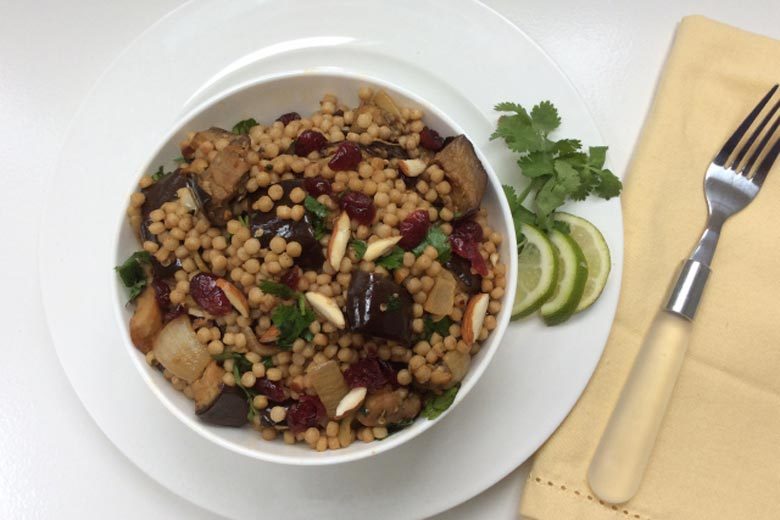
Recently, we have seen an alarming rise in websites, books, tabloids and in general, the popular press, promoting the “grain-free” movement. Turning our backs on wholesome, whole grains with their plethora of phytonutrients and fiber is akin to throwing out the baby with the bath water! Who would do that? But that’s precisely what many gullible consumers have been doing in an increasingly carbo-phobic culture! Whole grains are chock-full of fiber, which helps with a variety of important functions in the body,![]() not the least of which is that it helps maintain a healthy microbiome. And yet, the average American gets less than 15 to 20 grams of fiber per day. The recommended minimum is 25 to 38 grams of fiber per day.
not the least of which is that it helps maintain a healthy microbiome. And yet, the average American gets less than 15 to 20 grams of fiber per day. The recommended minimum is 25 to 38 grams of fiber per day.
How exactly does fiber help?
Did you know that fiber, which only comes from plant-based foods, actually feeds the beneficial bacteria in your GI tract? This means that the lack of fiber (from shunning whole grains and other healthy carbs such as beans, fruits and veggies), will starve the little critters in your gut, prompting them to say “see ya,” and allowing harmful bacteria to move in to the vacated space. Emerging research shows that these harmful bacteria thrive on a diet high in sugar, refined carbs, excess animal protein and fat, and have been associated with chronic inflammation, the basis of many chronic diseases. And this is only the tip of the iceberg.
The recipe below is an attempt on my part to sound the alarm to those of us who have been mistakenly shunning “good carbs” as a result of the media frenzy behind trendy diets du jour, such as the ketogenic and paleo, to name a few. That said, common sense would dictate that no matter how healthful those “good” carbs are, we do need to be mindful of the portion size to prevent large surges in blood sugar and insulin levels.
Whole wheat, warm couscous salad with roasted eggplant: It’s spring in New England, so although not cold enough for hot soup, there is just enough of a nip in the air to warrant making a warm salad. The succulent, roasted eggplant with a hint of spice and lime juice is tossed with toasted, whole-wheat couscous and freshly chopped garlic. Freshly squeezed lime juice adds a refreshing hint of tart, the toasted almonds a hint of crunch, and the cranberries a hint of unexpected sweetness. Did I mention, practically every ingredient is a nutritional star? This dish is packed with antioxidants from cranberries, garlic, eggplant and almonds, folate from parsley, healthful fats from olive oil and a hefty seven grams of fiber per serving from the whole-wheat couscous! Remember, if you eat whole, unprocessed, nutrient and fiber rich foods like this, those beneficial bacteria in your gut will be popping the champagne, having a party and will not want to leave their nutrient rich abode anytime soon!
Warm Roasted Eggplant Salad with Whole-Wheat Couscous and Cranberries
Ingredients
- 1½ cups vegetable broth
- 1 cup whole-wheat couscous, rinsed and drained
- 3 tablespoons plus 1 teaspoon olive oil, divided
- 1 large eggplant, cubed
- ½ teaspoon salt plus more to taste
- 1 to 1½ teaspoons berbere, divided*
- 2 heaping tablespoons plus ¼ teaspoon freshly squeezed lime juice, divided
- 1 small to medium yellow onion, diced
- 1 tablespoon minced fresh garlic
- 2 tablespoons chopped parsley or cilantro
- 1 tablespoon slivered almonds
- 2 to 3 tablespoons dried cranberries, divided
Instructions
- Heat oven to 350°F.
- Bring vegetable stock to boil in a pan.
- While the stock is heating, toast couscous in 1 teaspoon olive oil until light golden brown.
- Add the boiling vegetable stock to the couscous, allow to boil for a couple more minutes, give the pot a stir, reduce to a simmer and cook covered until all liquid is absorbed, about 10 minutes or so. Remove from heat, fluff lightly with a fork and let stand, covered, for a couple more minutes. Set aside.
- Mix 2 tablespoons olive oil with ¼ teaspoon lime juice, ½ teaspoon salt and ½ to ¾ teaspoon of berebere. In a large bowl, toss the cubed eggplant gently with this marinade until well coated.
- Place eggplant on an oiled rimmed baking sheet and transfer to the preheated oven. Roast for approximately 30 to 40 minutes, until eggplant is cooked through and fork tender, but not charred. Set aside.
- In a medium, thick bottomed pan, heat 1 tablespoon of olive oil and add the minced garlic, sauteing until a light golden brown. Watch for signs of burning, and regulate the heat accordingly.
- Add the diced onions, saute until soft and translucent. Add the remaining berbere to the garlic-onion mixture in the pan. (Use a couple of tablespoons of stock or water to deglaze the pan if the onions begin to stick to the bottom).
- Turn down the heat and gently fold in the roasted eggplant and cooked couscous.
- Switch off the heat and add 2 tablespoons of cranberries, salt and 2 tablespoons of lime juice, seasoning to taste.**
- Serve warm, garnished with parsley or cilantro, the slivered almonds and the remaining dried cranberries.
*May substitute Indian garam masala for Ethiopian berbere. Alternatively, may substitute any zesty seasoning of your choice. Note that the Ethiopian seasoning is spicy, so use per your discretion.
**My family likes food with a “spicy kick” so I add red pepper flakes. You may want to adjust according to your taste preference.





